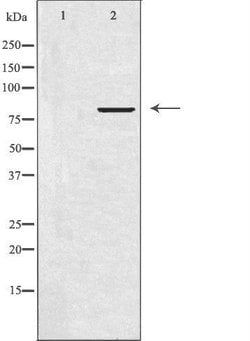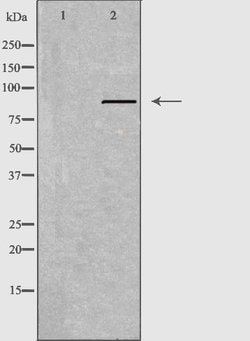SCNN1D Polyclonal Antibody, Invitrogen™
Manufacturer: Thermo Scientific
Select a Size
| Pack Size | SKU | Availability | Price |
|---|---|---|---|
| Each of 1 | PIPA5101418-Each-of-1 | In Stock | ₹ 46,502.50 |
PIPA5101418 - Each of 1
In Stock
Quantity
1
Base Price: ₹ 46,502.50
GST (18%): ₹ 8,370.45
Total Price: ₹ 54,872.95
Antigen
SCNN1D
Classification
Polyclonal
Conjugate
Unconjugated
Gene
SCNN1D
Gene Alias
Amiloride-sensitive sodium channel subunit delta; delta-ENaC; Delta-NaCH; DNACH; ENaCd; ENaCdelta; epithelial Na(+) channel subunit delta; MGC149710; Nonvoltage-gated sodium channel 1 subunit delta; SCNED; SCNN1D; sodium channel epithelial 1 delta subunit; sodium channel, non voltage gated 1 delta subunit; sodium channel, nonvoltage-gated 1, delta; sodium channel, non-voltage-gated 1, delta subunit; sodium channel, voltage-gated, type I, delta polypeptide
Host Species
Rabbit
Purification Method
Affinity chromatography
Regulatory Status
RUO
Gene ID (Entrez)
6339
Content And Storage
-20°C
Form
Liquid
Applications
Immunohistochemistry (Paraffin), Western Blot
Concentration
1 mg/mL
Formulation
PBS with 50% glycerol and 0.02% sodium azide; pH 7.4
Gene Accession No.
P51172
Gene Symbols
SCNN1D
Immunogen
A synthesized peptide derived from human SCNN1D(Accession P51172), corresponding to amino acid residues A575-E625.
Quantity
100 μL
Primary or Secondary
Primary
Target Species
Human
Product Type
Antibody
Isotype
IgG
Description
- Antibody detects endogenous levels of total SCNN1D
- SNX6 interacts with members of the transforming growth factor-beta family of receptor serine-threonine kinases
- These receptors belong to two classes: type II receptors that bind ligand, and type I receptors that are subsequently recruited to transduce the signal
- Of the type II receptors, SNX6 was found to interact strongly with ActRIIB and more moderately with wild type and kinase-defective mutants of TbetaRII
- Of the type I receptors, SNX6 was found to interact only with inactivated TbetaRI
- SNXs 1-4 also interacted with the transforming growth factor-beta receptor family, showing different receptor preferences
- Conversely, SNX6 behaved similarly to the other SNX proteins in its interactions with receptor tyrosine kinases
- Strong heteromeric interactions were also seen among SNX1, -2, -4, and -6, suggesting the formation in vivo of oligomeric complexes
- These findings are the first evidence for the association of the SNX family of molecules with receptor serine-threonine kinases.



